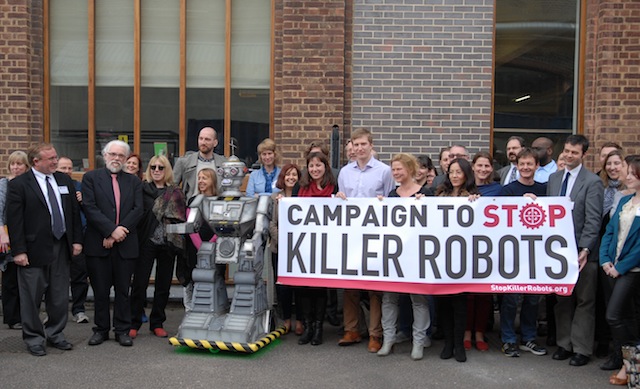 The Campaign to Stop Killer Robots is an international coalition comprised of nine NGO’s calling for a comprehensive, pre-emptive ban on the development, production and use of fully autonomous weapons (so called killer robots). The campaign was officially launched in April 2013 in London. In the meantime, the coalition is comprised of 50 NGOs in 23 countries. Before, the prospect of fully autonomous weapons was only debated by a small community of specialists, including military personnel, scientists, roboticists, philosophers and lawyers. But the campaign’s launch was the beginning of a rapid series of developments that eventually resulted in serious negotiations in international politics. 2014 seems promising in the battle against killer robots, but first, how did we get here?
The Campaign to Stop Killer Robots is an international coalition comprised of nine NGO’s calling for a comprehensive, pre-emptive ban on the development, production and use of fully autonomous weapons (so called killer robots). The campaign was officially launched in April 2013 in London. In the meantime, the coalition is comprised of 50 NGOs in 23 countries. Before, the prospect of fully autonomous weapons was only debated by a small community of specialists, including military personnel, scientists, roboticists, philosophers and lawyers. But the campaign’s launch was the beginning of a rapid series of developments that eventually resulted in serious negotiations in international politics. 2014 seems promising in the battle against killer robots, but first, how did we get here?
By Merel Ekelhof*
In April 2013 the Campaign to Stop Killer Robots issued its call for a ban on fully autonomous weapons. The campaign’s launch was a tremendous success, partially due to the intriguing performance of talking robot David Wreckham. As a consequence, the media picked up on the issue really well and killer robots were even addressed by a few British parliamentarians and a spokesperson of the British government. But more was to follow.
Only weeks after the launch United Nations Special Rapporteur Professor Christof Heyns presented his report on Lethal Autonomous Robots (LARs) to the United Nations Human Rights Council in Geneva. Heyns calls for an international moratorium on the research, development, testing, proliferation and use of LARs. This was the first time killer robots were discussed in an international forum. States were extraordinarily united on the issue. At least 20 states and three regional organizations, such was the European Union, spoke on the topic. One thing became exceedingly clear: the issue of lethal autonomous robots needs further discussion in national and international fora. So that’s what happened.
Growing interest
On national level interest in tackling killer robots is growing fast. Not only in the United Kingdom, but also in France, Germany, Norway and Italy the campaign’s gets underway. In October 2013 – exactly a year after the first meeting of the steering committee of the Campaign to Stop Killer Robots – the United Nations General Assembly First Committee on Disarmament and International Security met in New York. Sixteen countries highlighted fully autonomous weapons in their First Committee Statements and pointed out the need to discuss the issue on an international level. The question remained what forum should address these technologies but that conundrum was solved the next month during the annual meeting of the Convention on Certain Conventional Weapons (CCW) in Geneva.
In November 2013 Ambassador Jean-Hugues Simon-Michel of France proposed a mandate for the convention to convene on 13-16 May 2014 for its first meeting to discuss questions related to Lethal Autonomous Weapons Systems. Although decisions at the CCW are taken by consensus – meaning that a single nation could prevent the mandate from being adopted – no state objected to the mandate. This is a historic decision for the campaign. The mandate marks the beginning of international discussions and could lead to a ban on fully autonomous weapons, either through a sixth protocol of the CCW or through another international instrument negotiated outside the United Nations. Most importantly, the killer robots are on the agenda and states agree that these weapon systems can no longer be ignored.
Comprehensive and pre-emptive ban
Although fully autonomous weapons do not yet exist, the coalition has given killer robots the attention it deserves. This week, the coalition – that has doubled in members since the official launch in April – will come together for a strategy meeting. This NGO conference brings together members of the coalition to look at the current status of this issue and to strategize on actions to be undertaken in 2014 with the ultimate goal: a comprehensive, pre-emptive ban on fully autonomous weapons.
Find out more
PAX believes that the campaign’s significant outreach of the past year will be promising in achieving a comprehensive pre-emptive ban on these weapons. Therefore, PAX is part of the Campaign to Stop Killer Robots. For more information go to: www.stopkillerrobots.org.
* Merel Ekelhof is master student Law and Politics of International Security at Vrije Universiteit Amsterdam and is intern at PAX’ Killer Robots programme.



